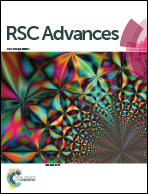Synthesis of soluble poly(vinylene carbonate) by redox-initiated RAFT process in microemulsion and its aminolysis yielding snow-white polymethylol
Abstract
The radical polymerization of vinylene carbonate (VCB) above 40 °C yields lightly colored and partially soluble polymers by common procedures. Herein, we describe a redox-initiated room temperature micro-emulsion process for the living polymerization of a VCB yielding polymer, which is entirely soluble in DMF, in the presence of a RAFT agent. Despite the polymerization following first order kinetics, the molecular weight–time plot exhibited a sudden rise at the beginning; however, a slow but linear increment was noticed after that, which is typical for a RAFT polymerization in a micro-emulsion. This procedure yielded entirely soluble polymers and the gel permeation chromatograms (GPC) implied an almost constant polydispersity index (PDI: 1.2) within 20–88% conversion range. The process was determined to be living as demonstrated by a chain extension with styrene, yielding a diblock copolymer with nearly double molecular weight. The livingness of the process was confirmed by synthesizing a chain extension of the polymer with styrene using a photo-iniferter technique. Nearly double molecular weight of the resulting polymer within 24 h of irradiation implied the formation of vinylene carbonate–styrene block copolymers. It was demonstrated that the VCB homopolymer readily dissolves in ammonia solution (25%) at room temperature and a snow-white precipitate of the aminolysis product, polymethylol, is observed within a few minutes. Polymethylol is known to be insoluble in common solvents, including water, due to the intermolecular hydrogen bridging. Surprisingly, the polymer was determined to dissolve in 80% phosphoric acid to give optically clear solutions, which were stable for over one week at room temperature. 1H NMR spectrum of this polymer in D3PO4 indicated a pure polymethylol structure.


 Please wait while we load your content...
Please wait while we load your content...